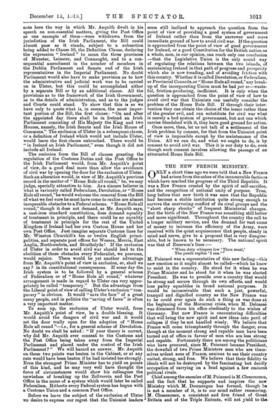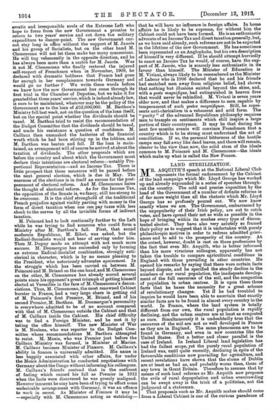THE NEW FRENCH MINISTRY.
ONLY a short time ago we were told that a New France had arisen from the ashes of the innumerable factions which have marked the progress of the Third Republic. It was a New France created by the spirit of self-sacrifice, and the recognition of national unity of purpose. True, long before that new birth it was seen that the Republic had become a stable institution quite strong enough to survive the enervating conflict of its rival groups and the " short sharp shocks" of frequent Ministerial changes. But the birth of the New France was something still better and more significant. Throughout the country the call to a longer military service, and the demand for vast sums of money to increase the efficiency of the Army, were received with the quiet acquiescence that people, steady in mind and nerve, give to a proposal that is very disagree- able, but is known to be necessary. The national spirit was that of Emerson's lines :- "Whoa duty whispers low Thou must,'
The youth replies I can.'"
M. Poincare was a representative of this new feeling—this new emotion as it might almost be called—which he knew to exist in the country. He stood for it when he was Prime Minister and he stood for it when he was elected President. He was to preside over a country that would be strong and secure through its own efforts, and would lose paltry squabbles in broad national purposes. It would be inconceivable that such a just, powerful, tranquil and dignified country as the New France was to be could ever again do such a thing as was done at the beginning of the Moroccan crisis, when M. Delcosse was dismissed from his office obediently to the wishes of Germany. But now France is encountering difficulties that will bring the new spirit and new ideas into peril of collapse if they be not handled wisely. We believe that France will come triumphantly through the danger, even though at the moment strong and capable men have been turned out of office in favour of men who are less strong and capable. Fortunately there are among the politicians who have procured, since M. Poinca.re became President, the downfall of two Prime Ministers men who are them- selves ardent eons of France, anxious to see their country united, strong, and free. We believe that their fidelity to ideals will not be destroyed by the fascinating but deadly occupation of carrying on a feud against a few eminent political rivals. Chief among the enemies of M. Poincare is M. Clemenceau, and the fact that he supports and inspires the new Ministry which M. Doumer•gue has formed, though he is not a member of it, is to our mind rather reassuring. M. Clemenceau, a consistent and firm friend of Great Britain and of the Triple Entente, will not yield to the erratic and irresponsible souls of the Extreme Left who hope to force from the new Government a promise to return to two years' service and cut down the military expenditure to danger-point. The new Government can- not stay long in office without the support of M. Jaures and his group of Socialists, but on the other hand M. Clemenceau will not let them make too many concessions. He will tug vehemently in the opposite direction, and he has always been more than a match for M. Jaures. Was it not M. Clemenceau who finally restored the injured self-respect of Frenchmen when in November, 1908, he declared with dramatic boldness that France had gone far enough in her complaisance towards Germany and would go no further ? We write these words before we know how the new Government has come through its first trial in the Chamber of Deputies, but we take it for granted that three years' service, which is indeed already law, is sure to be maintained, whatever may be the policy of the Government as to the loan of £52,000,000. M. Barthou's Ministry fell last week, not on the question of the loan itself, but on the special point whether the dividends should be taxed. M. Barthou tried to resist the recommendation of the Budget Committee that the dividends should be taxed, and made his resistance a question of confidence. M. Caillaux then unmasked the batteries of the financial wrath which he had been stirring up in the lobbies, and M. Barthou was beaten and fell. If the loan is main- tained, an arrangement will of course be arrived at about the taxation of dividends. The other proposals which are before the country and about which the Government must declare their intentions are electoral reform—notably Pro- portional Representation—and an Income Tax. There is little prospect that these measures will be passed before the next general election, which is due in May. The nearness of the elections is in itself an excuse for the post- ponement of electoral reform. And M. Clemenceau hates the thought of electoral reform. As for the Income Tax, the opposition of the Senate is, we fancy, still too strong to be overcome. It is the chief stronghold of the traditional French prejudice against visibly parting with money in the form of direct taxation when one can pay taxes with less shock to the nerves by all the invisible forms of indirect taxation.
M. Poincare had to look continually further to the Left while he was trying to find someone who could form a Ministry after M. Barthou's fall. First, that sound moderate Republican, M. Ribot, was asked, but the Radical-Socialists would not hear of serving under him. Then M. Dupuy made an attempt with not much more success. IL Doumergue has succeeded only by forming an extreme Radical-Socialist combination, strongly anti- clerical in character, which is by no means pleasing to the President, who notoriously advocates apaisement. In the struggle which has been carried on between M. Poincare and M. Briand on the one hand, and M. Clemenceau on the other, M. Clemenceau has already scored several points since his opponent's great triumph of getting himself elected at Versailles in the face of M. Clemenceau's denun- ciations. Thus, M. Clemenceau, the most renowned Cabinet burster in France, had a very large share in getting rid of M. Poincare's first Premier, M. Briand, and of his second Premier, M. Barthou. M. Doumergue's personality is everywhere admitted to be of no account compared with that of M. Clemenceau outside the Cabinet and that of M. Caillaux inside the Cabinet. His chief difficulty was to find a Foreign Minister, and he met it by taking the office himself. The new Minister of War is M. Noulens, who was reporter to the Budget Com- mittee whose recommendations M. Barthou attempted to resist. M. Monis, who was Premier just before the Caillaux Ministry was formed, is Minister of Marine.
Caillaux becomes Minister of Finance. M. Caillaux's ability in finance is universally admitted. His name is less happily associated with other affairs, for under the Moths Administration he conducted negotiations with Germany about the Congo without informing his colleagues. M. Caillaux's friends contend that in the outburst of feeling which caused his fall as Premier in 1912 when the facts were discovered he was grossly maligned. However innocent he may have been of trying to effect some undesirable arrangement with Germany, it was an offence to work in secret. As Minister of Finance it may be —especially with M. Clemenceau acting as watchdog— that he will have no influence in foreign affairs. In home affairs he is likely to be supreme, for without him the Cabinet could not have been formed. He is an enthusiastic advocate of an Income Tax and direct taxation generally, but, as we have said already, such reforms are not to be expected in the lifetime of the new Government. He has sometimes been represented as an Anglophobe, but his own description of himself is very different. If he should attempt hurriedly to enact an Income Tax he would, of course, have the sup- port of M. Jaures, who is scarcely less enthusiastic in its favour than himself. The Minister of Education is M. Viviani, always likely to be remembered as the Minister of Labour who in 1906 declared that he and his friends had snatched men away from religious belief, had shown that nothing but illusions existed beyond the skies, and, with a geste magnifique, had extinguished in heaven fires that would never be rekindled. M. Viviani is seven years older now, and that makes a difference to men capable by temperament of such gestes magniflques. Still, he repre- sents anti-clericalism in a vehement and arid form. The " purity " of the advanced Republican philosophy requires men to trample on sentiments which still inspire a large portion of their countrymen. It may be that during the next few months events will convince Frenchmen that a country which is to be strong must understand the art of conciliation. If so, the personal bitterness of the hostile camps may fall away like dead leaves, and there will remain, clearer to the view than now, the solid stem of the ideals common to M. Poincare and M. Clemenceau—the ideals which make up what is called the New France.



























































 Previous page
Previous page